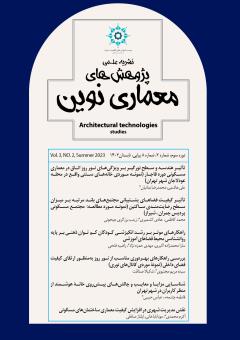شناسایی مزایا و معایب و چالشهای پیش روی خانۀ هوشمند از منظر کاربران در شهر تهران
محورهای موضوعی :
1 - کارشناسی ارشد معماری داخلی، دانشگاه علم و فرهنگ، تهران ایران.
2 - مربی گروه معماری، دانشگاه علم و فرهنگ، تهران، ایران
کلید واژه: خانۀ هوشمند, اینترنت اشیاء, اتوماسیون, فضایخانگی.,
چکیده مقاله :
در دنیای امروز، فناوریها به حدی از پیشرفت و توسعه رسیدهاند که در سطح زندگی روزمره نیز غیر قابل چشمپوشی هستند. خانۀ هوشمند نمایانگر تعریف جدیدی از فضای خانگی است که با ورود هرچه بیشتر فناوری به خانهها همراه میباشد. جایگاه هوشمندسازی در ایران، بهعنوان یک پدیده وارداتی نیازمند مطالعه و بررسیهای بیشتر است. هدف از این پژوهش پیدا کردن چالشهای پیش روی هوشمندسازی در خانههای ایرانی و دریافتن نوع نگرش کاربران به این موضوع است. در ادامه سعی شده است تا مزایا و معایب و نقاط قوت و ضعف خانۀ هوشمند با تکیه بر تجربه زیسته کاربران شهر تهران مورد بررسی قرار گیرد. این پژوهش برمبنای هدف یک تحقیق بنیادی و از حیث روش، یک مطالعه کیفی به شیوۀ مردمنگاريست که با انجام مصاحبه عمیق و نیمه ساختاریافته با دو گروه کاربران بالفعل و بالقوه خانۀ هوشمند در شهر تهران انجام شده است. دادههای حاصل از مصاحبهها با استفاده از نرمافزار اطلستی نسخه 9 مورد تحلیل موضوعی قرار گرفته است. یافتههای این پژوهش حکایت میکند که مؤلفههای مختلفی در میزان رضایت کاربران از هوشمندسازی خانهها مؤثر هستند که در گروه کاربران بالفعل عبارتند از مؤلفههای؛ روانشناختی، اجتماعی، اقتصادی، فرهنگی، زیرساخت و تکنولوژی و در گروه کاربران بالقوه نیز شامل مؤلفههای؛ اقتصادی، اجتماعی و فرهنگی میباشد. نتایج نشان میدهد که علیرغم تصورات اولیه، کاربران بالفعل غالباً از زیستن در این فضاها احساس رضایت میکنند و حتی درصورت عدم رضایت کامل، مزایای هوشمندسازی را انکار نمیکنند. درواقع مهمترین چالش برای پذیرش خانۀ هوشمند از دیدگاه هر دو گروه، هزینههای بالای آن است.
In today's world, technologies have reached such a level of progress and development that they cannot be ignored at the level of daily life. The smart house represents a new definition of the home space, which is associated with the entry of more and more technology into homes. The place of intelligentization in Iran, as an imported phenomenon, needs further study and investigations. The purpose of this research is to find the challenges facing smart building in Iranian homes and find out the users' attitude towards this issue. In the following, it has been tried to examine the advantages and disadvantages and the strengths and weaknesses of the smart home based on the lived experience of the users of Tehran. This research is based on the purpose of a fundamental research and in terms of method, it is a qualitative ethnographic study that was conducted by conducting in-depth and semi-structured interviews with two groups of actual and potential smart home users in Tehran. The findings of this research indicate that various components are effective in the level of users' satisfaction with the smartness of homes, which in the group of actual users include the components; psychological, social, economic, cultural, infrastructure and technology and in the group of potential users also includes the components; It is economic, social and cultural. The results show that despite the initial ideas, actual users often feel satisfied with living in these spaces and even if they are not completely satisfied, they do not deny the benefits of smartening. In fact, the most important challenge for the adoption of a smart home from the point of view of both groups is its high costs.
